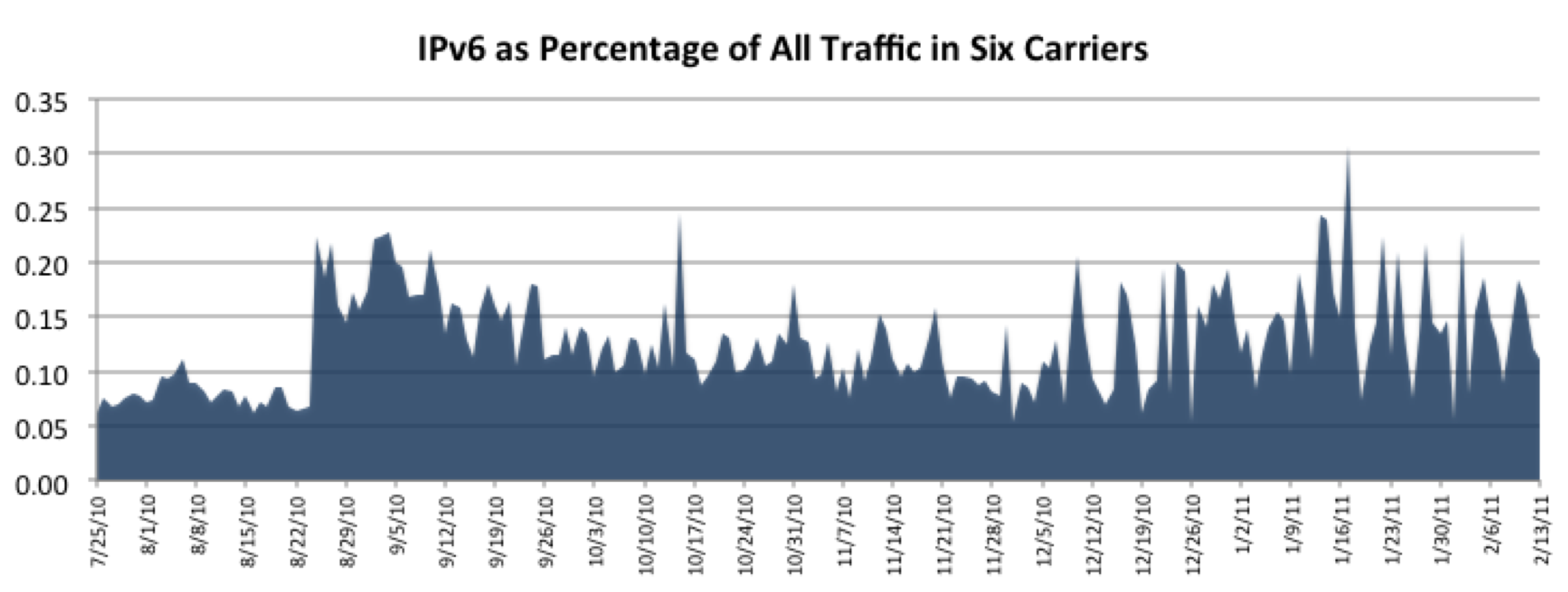How far has the Internet come with IPv6 Adoption?


Oh, no one's going to try to Google "Lady Gaga" tomorrow and find that her YouTube videos are gone. But, if you're in charge of a business, you're eventually going to need more Internet addresses and the IPv4 address cupboard is bare. Indeed, the Asia Pacific Network Information Centre (APNIC), which is in charge of all Asian Internet addresses, is now down to its last IPv4 crumbs.
The situation isn't a lot better in North America. The American Registry for Internet Numbers (ARIN) tells me that, "ARIN has seen a steady, if not, slight decline in the number of IPv4 request since IANA reached depletion of their IPv4 pool in early February 2011. However, ARIN has seen a substantial increase in the number of IPv6 requests since that same time. Currently, ARIN has over 5 /8s of IPv4 address and expects this will last through most of this year and possibly into next year."
When things get really tight with IPv4 addresses, which at this rate will be in the late fall of 2011, ARIN may start restricting IP [Internet Protocol] allocations. In the meantime, you can try to buy IPv4 addresses, but that's a short term solution. The bottom line is we're running out of IPv4 addresses and we must start switching over.
Unfortunately, as Arbor Network's Chief Scientist Craig Labovitz points out, "Despite fifteen years of IPv6 standards development, vendor releases and advocacy, only a small fraction of the Internet has adopted IPv6. The slow rate of IPv6 adoption stems from equal parts of technical / design hurdles, lack of economic incentives and general dearth of IPv6 content."
Indeed, "During the six month study period, IPv4 inter-domain traffic grew by an average of 40-60%. In marked contrast, IPv6 (both native and tunneled) decreased by an average 12%, though the small volumes of native IPv6 more than doubled." Yes, that's right, Internet traffic is going to boom, but the next generation of IP that's required to handle this traffic has actually done down as a percentage of all Internet traffic.
Page 2: [Internet Traffic] »
Internet Traffic
Overall, IPv6 traffic is growing, but it's a tiny fraction of the whole. Indeed, it's almost just noise with a peak of only 0.25% of all net traffic. What traffic that is carried by IPv6 is largely. 61%, Peer-to-Peer (P2P) using BitTorrent and the like.
The mainstream, Ipv4-based Internet traffic is largely made up of video-20% Netflix; 12% YouTube; and 6% Flash-with the Web using 19% and BitTorrent only taking up 8%.
Arbor Network's study was based on "a small subset of ATLAS [Arbor's distributed darknet sensor network] deployments both upgraded their backbone infrastructure (routers and monitoring appliances) and enabled V9 Flow export across the majority of their network. The report analyzes native v6 traffic across six of these large providers in North America and Europe over the last six months. In all, we analyzed aggregate inter-domain traffic volumes of more than 8 Terabits per second and a total of more than 10 Exabytes over the life of the study." For further details on Arbor's methodology, see Internet Inter-Domain Traffic (PDF Link).
Of what Internet traffic is carried by IPv6, Arbor found that "the 250,000 IPv6 tunnel end points exhibit an extremely heavy tailed traffic distribution. The top five tunnel end points contribute more than 90% of all tunneled IPv6 traffic. These top end points include the Anycast address (192.88.99.1) followed by Hurricane Electric tunnel broker ranges and Microsoft's Teredo (65.55.158.118)."
Labovitz sees the upcoming "World IPv6 Day" [On June 8, 2011] as marking "a major milestone in the Internet's evolution," because it represents the first global experiment in new Internet technologies. What will happen on v6 day? Will the flood of IPv6 traffic result in network failures? Will operators and vendors discover critical bugs in network infrastructure? As an industry, we're not sure -- that is why this V6 day experiment is so crucial."
The World IPv6 Day is important. We do need to know what will break and what won't in a global test of the IPv6 Internet, but to me Arbor's research has already shown the real problem with IPv6. Companies and ISPs are still lagging way, way behind in adopting it. Regardless of what happens on June 8, I can see real network deployment and management headaches ahead in 2012 when, like it or not, ready or not, everyone is going to have to start moving to IPv6.
Related Stories:
It's official: Asia's just run out of IPv4 Addresses
Don't Panic! It's only the Internet running out of Addresses